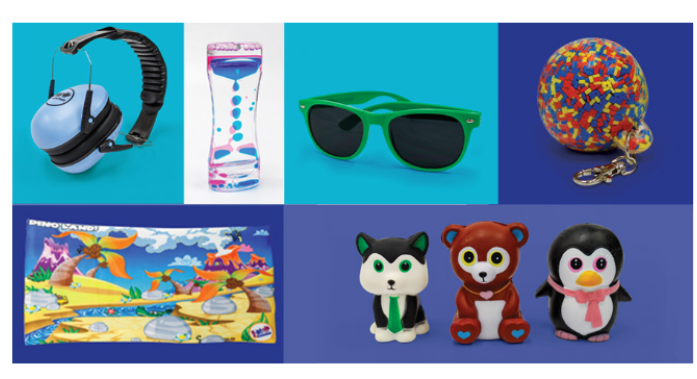On July 25, 2024, 26 librarians from across the country came together to discuss the topic of neurodiversity in both Storytimes specifically and in libraries as a whole. The conversation sparked several questions, ideas, and thoughts as it continued, and it ended with a good number of resources for folks to take back to their own environments. Please see below for more information!
Definition of Neurodivergent – differing in mental or neurological function from what is considered typical or normal (frequently used with reference to autistic spectrum disorders); not neurotypical.
One of the common themes that emerged from the discussion is the use of “Sensory Bags” or “Sensory Kits.” These include a variety of items that folks with sensory needs can use to make experiences at the library more comfortable for them. Some examples of materials are:
- Noise cancellation headphones
- Sunglasses
- Board book
- Weighted blanket
- Indestructible book
- Calming Strips
- Fidgets
- Leg bands for chairs
- Card inside bag (menu of options)
Jefferson County Public Library’s inclusive materials include noise reduction headphones, glitter timers, sunglasses, fidget key chain balls, squishy animals and Find Me lap pad (pictured below).

Overall, it was shared that the materials used in these bags were expensive to procure and were used with some frequency, with the noise cancellation headphones being the most loved. Because of this, it was recommended that the bags be used in specific circumstances, like having them available at a table during Storytime or accessible at the front desk of the library as opposed to being freely usable.
In order to clean and maintain the materials, it is important to have some budget set aside for their repair/replacement. It is also a good idea to purchase materials that are easy to clean (like weighted blankets that can be wiped down instead of having to go into a washing machine).
There are many tools libraries are using to share the availability of sensory resources with families, including website messaging, word-of-mouth discussions during Storytime, and working with the Autism community to share accessibility information with their networks. Please see the resources list at the end of this blog for some places to begin connecting.
In advertising these kits, it was noted that library staff must all be versed in the proper terminology needed to provide a welcoming environment for families and library users with special needs. There are some excellent resources available for this, including some provided by the American Sign Language instructor, Kathy MacMillan, who presented for CLEL earlier this year. Additionally, libraries can potentially become listed as certified Autism centers through this certifiedautismcenter.com.
It was noted that it is important to ensure nobody is being singled out by the messaging librarians are providing. Sensory materials should be available to anyone who needs them, even if library users do not identify as neurodiverse.
Many libraries have attempted to provide programs like this Developmental Playgroup program at Arlington Heights Memorial Library. These types of events are specifically tailored to families with special needs, and they primarily discovered that:
- It is difficult to get the timing right around all the other appointments families need to attend, and
- The general public ended up filling those programs, anyway.
So, by offering events that cater to families with special needs without advertising them as such, libraries are creating more of an inclusive environment that will support all kinds of families.
An inclusive environment also includes ADA compliance, accessible websites, and ensuring all access points are open to everyone. This is an ongoing project in many places, but it is one that is showing positive momentum and encouraging results. Library corners and spaces such as these can be positive examples for other libraries to follow.
In general, libraries are taking big steps in the direction of supporting users of a wide variety of backgrounds through not only programming and materials but also through inclusive messaging.
Resources for serving Neurodivergent families can be found here:
- Autism Community Store, Aurora
- The Sensory Club Denver
- Stories by Hand
- Sensory Support Kits Are Here! (Arapahoe Libraries)
- Sensory Tour Videos (Pikes Peak Library District)
- More Than Welcome: Libraries Serving Families of Young Children with Disabilities (YouTube Video from Kentucky University’s Human Development Institute)
We hope you have found this blog to be helpful, and we hope you will join us for our next meetup!
Member Meetup: Decodable Readers
Wednesday, September 11, 1-2pm
Event Link: https://www.clel.org/event/member-meetup-decodable-readers/
